
At the 1900 Summer Olympics one gymnastics event for men was contested. The competition was held on Sunday, 29 July 1900, and on Monday, 30 July 1900. There were 135 competitors from 8 nations. The top 18 places were taken by French gymnasts, of which there were more than 100. The event was won by Gustave Sandras, with Noël Bas finishing second and Lucien Démanet third. The highest-placing foreign gymnast was Jules Ducret of Switzerland, in a tie for 19th place.

The men's horizontal bar was a gymnastics event contested as part of the Gymnastics at the 1964 Summer Olympics programme at the Tokyo Metropolitan Gymnasium. The event was held on 18, 20, and 23 October. There were 128 competitors from 29 nations, with nations in the team competition having up to 6 gymnasts and other nations entering up to 3 gymnasts. The event was won by Boris Shakhlin of the Soviet Union, the nation's first victory in the horizontal bar after two Games with silver and bronze medals. The Soviets also took silver, with Yuri Titov finishing second. Shakhlin and Titov were the fifth and sixth men to win multiple medals in the horizontal bar. Bronze went to Miroslav Cerar of Yugoslavia.

The men's pommel horse competition was one of eight events for male competitors of the artistic gymnastics discipline contested in the gymnastics at the 2004 Summer Olympics in Athens. The qualification and final rounds took place on August 14 and August 22 at the Olympic Indoor Hall. There were 80 competitors from 31 nations, with nations competing in the team event having up to 5 gymnasts and other nations having up to 2 gymnasts. The event was won by Teng Haibin of China, the nation's first victory in the pommel horse since 1984 and second overall. Marius Urzică of Romania took silver to become the first man to win three medals on the pommel horse. Takehiro Kashima put Japan back on the pommel horse podium for the first time since 1988 with his bronze.
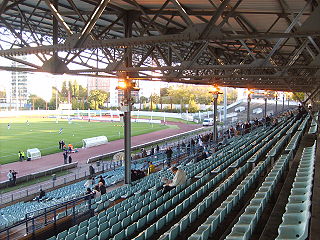
The men's parallel bars event was part of the gymnastics programme at the 1924 Summer Olympics. It was one of nine gymnastics events and it was contested for the third time after 1896 and 1904. The competition was held on Sunday, July 20, 1924. Seventy-two gymnasts from nine nations competed. The event was won by August Güttinger of Switzerland, the nation's first victory in the event. Robert Pražák of Czechoslovakia and Giorgio Zampori of Italy earned silver and bronze, respectively.

The men's pommel horse event was part of the gymnastics programme at the 1924 Summer Olympics. It was one of nine gymnastics events and it was contested for the third time after 1896 and 1904. The competition was held on Wednesday, July 23, 1924. Seventy gymnasts from nine nations competed, with each nation having an 8-gymnast team. The event was won by Josef Wilhelm of Switzerland, the nation's second victory in the event. With Swiss gymnasts Jean Gutweninger and Antoine Rebetez taking silver and bronze, respectively, it was the second consecutive appearance of the event in which the event's medals were swept.
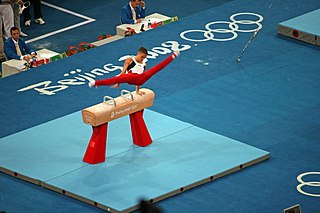
The men's pommel horse competition at the 2008 Summer Olympics was held on August 17 at the Beijing National Indoor Stadium. The eight competitors with the highest scores in qualifying proceeded to the men's pommel horse finals. There, each gymnast performed again; the scores from the final round determined the final ranking. There were 76 competitors from 27 nations that competed on the pommel horse, with nations in the team event entering up to 5 gymnasts while other nations could enter up to 2. The event was won by Xiao Qin of China, the nation's second consecutive and third overall victory in the pommel horse. The other two medals went to nations that had never earned a medal in the event before: Filip Ude of Croatia took silver while Louis Smith of Great Britain finished with bronze.

The men's artistic individual all-around event was part of the gymnastics programme at the 1924 Summer Olympics. It was one of nine gymnastics events and it was contested for the sixth time. The competition was held from Thursday, 17 July 1924, to Wednesday, 23 July 1924. Seventy-two gymnasts from nine nations competed. Each nation could send up to 8 gymnasts, up from 6 in previous Games. For the first time since 1904, the scores for individual competitors were used to calculate a team score. The men's artistic individual all-around was won by Leon Štukelj of Yugoslavia. Czechoslovakia's Robert Pražák took silver, while Bedřich Šupčík earned bronze. Both nations were making their debut in the event.

The men's pommel horse event was part of the gymnastics programme at the 1932 Summer Olympics. It was contested for the fifth time after 1896, 1904, 1924, and 1928. The competition was held on Thursday, August 11, 1932. Ten gymnasts from five nations competed. Each nation was limited to three gymnasts. The event was won by István Pelle of Hungary, the nation's first medal in the pommel horse. Italy also earned its first medal in the event, with Omero Bonoli's silver. Frank Haubold took bronze, the United States' first medal in the event since 1904.
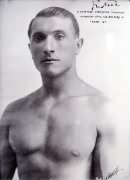
The men's artistic individual all-around event was part of the gymnastics programme at the 1932 Summer Olympics. It was the eighth appearance of the event, which was established in 1900. The competition was held from Monday, August 8, 1932, to Wednesday, August 10, 1932. Twenty-four gymnasts from five nations competed. Each nation could enter a team of 5 gymnasts; Hungary sent only 4. The event was won by Romeo Neri of Italy, the nation's first victory in the event since 1920 and fourth overall. István Pelle of Hungary took silver and Heikki Savolainen of Finland earned bronze; it was the first medal in the event for each nation.

The men's pommel horse competition was one of eight events for male competitors in artistic gymnastics at the 2000 Summer Olympics in Sydney. The qualification and final rounds took place on September 16 and 24 at the Sydney SuperDome. There were 80 competitors from 29 nations; nations competing in the team event could have up to 5 gymnasts in the vault, while other nations could have up to 2 gymnasts. The event was won by Marius Urzică of Romania, the nation's first victory in the men's pommel horse. France earned its first medal in the event, with Eric Poujade's silver. Bronze went to Alexei Nemov of Russia, his second consecutive bronze medal in the event. Urzică and Nemov were the eighth and ninth men to win multiple medals in the pommel horse.

The men's pommel horse competition was one of eight events for male competitors in artistic gymnastics at the 1996 Summer Olympics in Atlanta. The qualification and final rounds took place on July 20, 22 and 28th at the Georgia Dome. There were 102 competitors from 31 nations, with nations in the team event having up to 7 gymnasts and other nations having up to 3 gymnasts. The event was won by Li Donghua of Switzerland, the nation's first victory in the men's pommel horse since 1928. It was the first time since 1980 that the pommel horse did not have a tie for first place. Marius Urzică earned Romania's first pommel horse medal with his silver, while Alexei Nemov earned Russia's first as a nation separate from the Soviet Union with his bronze.
The men's pommel horse competition was one of eight events for male competitors in artistic gymnastics at the 1992 Summer Olympics in Barcelona. The qualification and final rounds took place on 27 July, 29 July and 2 August at the Palau d'Esports de Barcelona. There were 93 competitors from 25 nations, with nations in the team event having 6 gymnasts while other nations could have up to 3 gymnasts. For the third consecutive Games, the pommel horse ended in a tie for the gold medal. Belarusian Vitaly Scherbo and North Korean Pae Gil-su shared the top place. It was North Korea's first medal in the event. Bronze went to Andreas Wecker of Germany.

The men's pommel horse competition was one of eight events for male competitors in artistic gymnastics at the 1988 Summer Olympics in Seoul. The qualification and final rounds took place on September 18, 20 and 24th at the Olympic Gymnastics Hall. There were 89 competitors from 23 nations, with nations competing in the team event having 6 gymnasts and other nations having up to 3 gymnasts. For the second time, the event ended in a three-way tie for first place. Dmitry Bilozerchev of the Soviet Union, Zsolt Borkai of Hungary, and Lubomir Geraskov of Bulgaria each received a gold medal. It was Bulgaria's first medal in the pommel horse. Hungary had its third gold medal in four Games, with Zoltán Magyar winning in 1976 and 1980 before the nation was part of the Soviet-led boycott in 1984. The Soviets had had an eight-Games medal streak in the event snapped by that boycott; Bilozerchev's medal put the nation back on the podium after that one-Games absence.

These are the results of the men's pommel horse competition, one of eight events for male competitors in artistic gymnastics at the 1972 Summer Olympics in Munich. The qualification and final rounds took place on August 27, 29 and September 1 at the Sports Hall. There were 111 competitors from 26 nations ; nations entering the team event had 6 gymnasts while other nations could have up to 3 gymnasts. The event was won by Viktor Klimenko of the Soviet Union, the nation's fourth victory in the men's pommel horse. Sawao Kato (silver) and Eizo Kenmotsu (bronze) returned Japan to the pommel horse podium after a one-Games absence.

The men's pommel horse competition was one of eight events for male competitors in artistic gymnastics at the 1980 Summer Olympics in Moscow. The qualification and final rounds took place on July 20, 22 and 25 at the Luzhniki Palace of Sports. There were 65 competitors from 14 nations, with nations competing in the team event having 6 gymnasts while other nations could have to up to 3 gymnasts. The event was won by Zoltán Magyar of Hungary, the third man to successfully defend an Olympic title in the pommel horse. Silver went to Alexander Dityatin, extending the Soviet Union's podium streak in the event to eight Games. Michael Nikolay of East Germany took bronze for the second consecutive Games. Magyar and Nikolay were the sixth and seventh men to earn multiple pommel horse medals.

The men's pommel horse competition was one of eight events for male competitors in artistic gymnastics at the 1984 Summer Olympics in Los Angeles. The qualification and final rounds took place on July 29, 31 and August 4 at UCLA’s Pauley Pavilion. There were 71 competitors from 19 nations, with nations competing in the team event having 6 gymnasts while other nations could have to up to 3 gymnasts. The event was won in a tie between Li Ning of China, in the nation's debut in the Games, and Peter Vidmar, with the United States' first gold medal in the pommel horse since 1904 and first medal in the event since 1932. The bronze medal went to another American, Tim Daggett. The Soviet Union's eight-Games podium streak in the event ended with no Soviets competing due to the boycott.
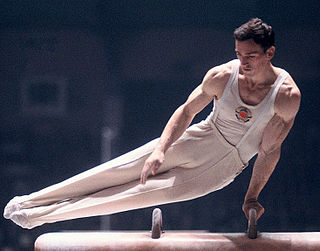
The men's pommel horse competition was one of eight events for male competitors in artistic gymnastics at the 1968 Summer Olympics in Mexico City. The event was held from 22 to 26 October at the Auditorio Nacional. There were 115 competitors from 27 nations, with nations in the team competition having up to 6 gymnasts and other nations entering up to 3 gymnasts. The event was won by Miroslav Cerar of Yugoslavia, the second man to successfully defend an Olympic pommel horse title. Olli Laiho of Finland took silver, while Mikhail Voronin of the Soviet Union finished with bronze. Japan's three-Games podium streak in the event ended, while the Soviet streak stretched to five Games.
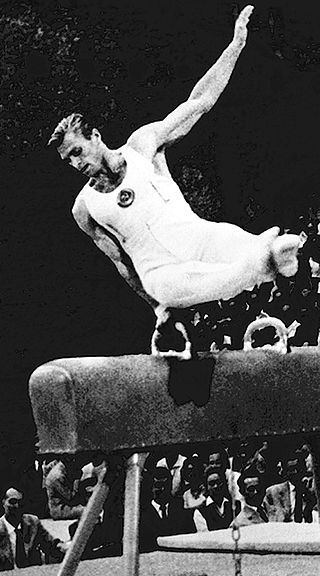
The men's pommel horse competition was one of eight events for male competitors in artistic gymnastics at the 1960 Summer Olympics in Rome. It was held on 5, 7, and 10 September at the Baths of Caracalla. There were 128 competitors from 28 nations, with nations in the team competition having up to 6 gymnasts and other nations entering up to 2 gymnasts. There was a tie for first place in the pommel horse. Boris Shakhlin of the Soviet Union and Eugen Ekman of Finland each received a gold medal. It was the third consecutive Games with a gold medal for the Soviets, as Shakhlin became the first man to successfully repeat as Olympic champion in the event. Ekman's medal was the only medal in men's artistic gymnastics in 1960 that did not go to the Soviet Union or Japan. Third place and the bronze medal went to Japan's Shuji Tsurumi.

The men's parallel bars competition was one of eight events for male competitors in artistic gymnastics at the 1960 Summer Olympics in Rome. It was held on 5, 7, and 10 September at the Baths of Caracalla. There were 129 competitors from 28 nations, with nations in the team competition having up to 6 gymnasts and other nations entering up to 2 gymnasts. The event was won by Boris Shakhlin of the Soviet Union, the nation's second consecutive victory in the men's parallel bars. Giovanni Carminucci earned Italy's first medal in the event since 1932 with his silver. Takashi Ono of Japan took bronze for a second consecutive Games, making him the fourth man to win multiple medals in the event.
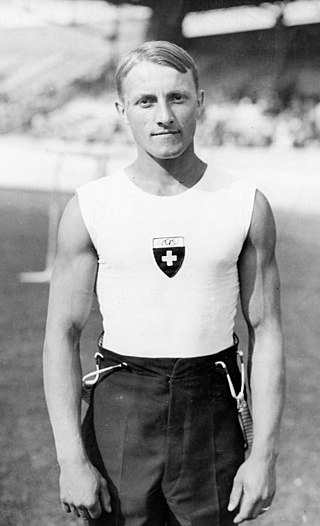
The men's artistic individual all-around event was part of the gymnastics programme at the 1928 Summer Olympics. It was one of seven gymnastics events for men and was the seventh Olympic men's all-around gymnastic championship. Scores from the individual apparatus events were added to give aggregate scores for the individual all-around; individual all-around scores were similarly summed for the team all-around event. There were 88 competitors from 11 nations. Each nation sent a team of 8 gymnasts. The event was won by Georges Miez of Switzerland, with his countryman Hermann Hänggi taking silver. They were the first medals in the event for Swiss gymnasts since 1904 and the first gold medal ever for a Swiss man in the individual all-around. Defending Olympic champion Leon Štukelj of Yugoslavia finished with the bronze this time, making him the third man to win multiple medals in the event.


















